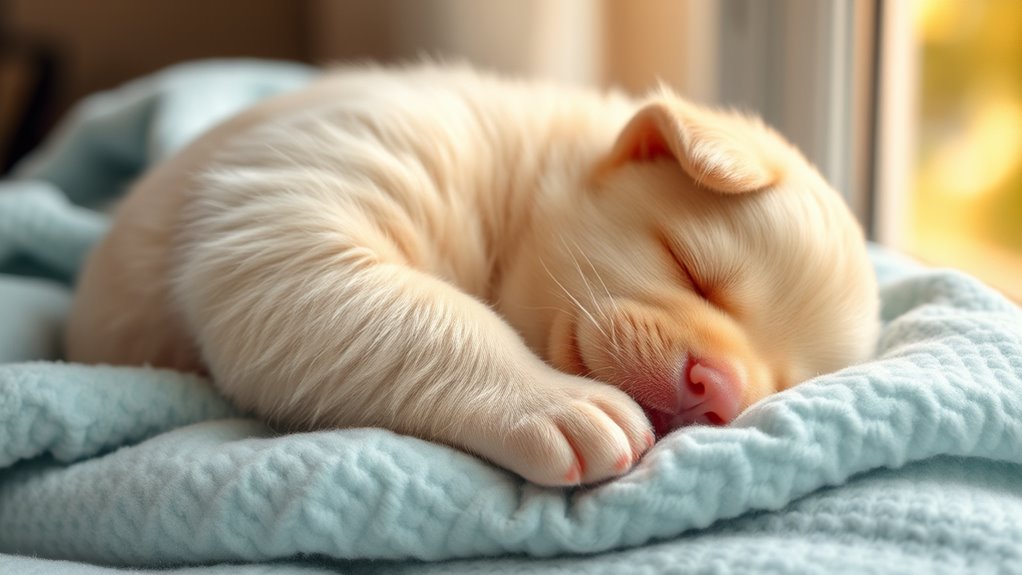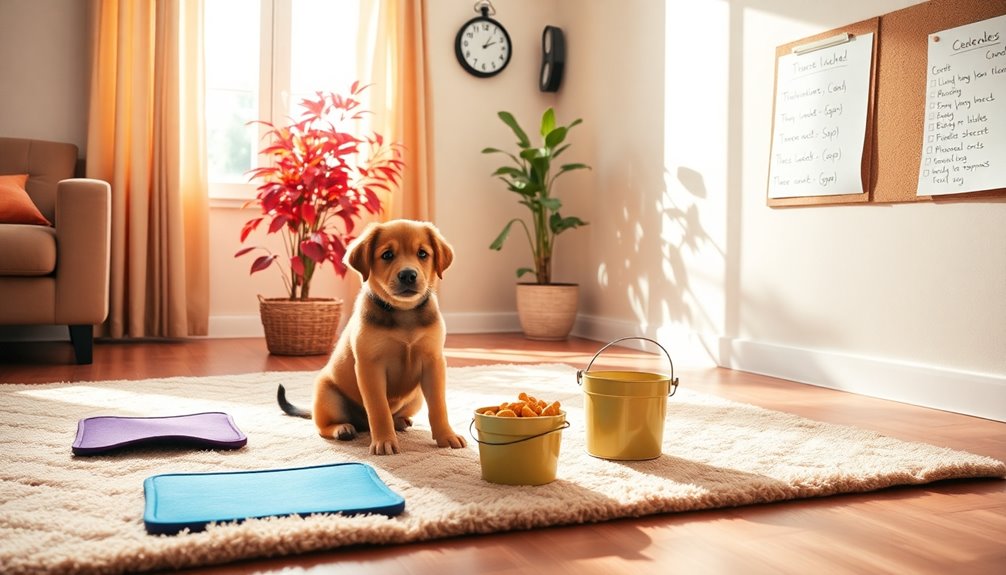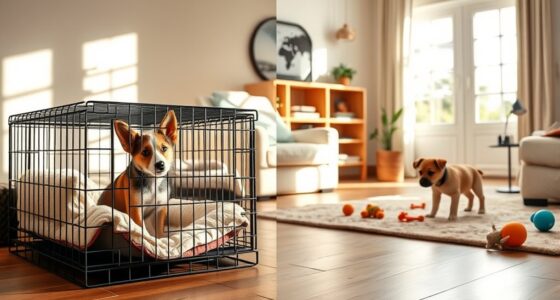Puppies need a lot of sleep—about 18 to 20 hours a day—especially in their early weeks. This rest supports their rapid growth, strong immune system, and brain development. As they grow, their sleep gradually decreases but remains substantial. Providing a quiet, comfy space and a consistent routine helps guarantee they get enough rest. If you want to discover tips for promoting healthy sleep habits, keep exploring the details below.
Key Takeaways
- Newborn puppies sleep 18-20 hours daily, gradually decreasing to 12-16 hours by a few months old.
- Sleep supports rapid growth, brain development, immune function, and behavioral learning.
- A quiet, consistent environment is essential for healthy sleep habits.
- Proper nutrition influences sleep quality by maintaining energy levels and reducing rest disruptions.
- Monitoring sleep patterns helps identify potential health issues or behavioral concerns.

Puppies need a lot of sleep to support their rapid growth and development, often more than adults do. During this essential period, sleep isn’t just about rest; it’s indispensable for their physical health, brain development, and immune system. As a responsible pet owner, you’ll want to understand how much sleep your puppy needs and how to create an environment that promotes healthy rest. Proper puppy nutrition plays a critical role here, as a well-balanced diet can influence sleep quality and energy levels. Feeding your puppy the right nutrients at appropriate times ensures they stay energized when awake and rest deeply when sleeping. It’s equally important to follow puppy training tips that help establish a consistent routine, which in turn promotes better sleep patterns.
In the early weeks, your puppy might sleep anywhere from 18 to 20 hours a day, especially if they’re very young. As they grow, this amount gradually decreases but remains significant—expect around 12 to 16 hours of sleep for most puppies by the time they’re a few months old. During naps, your puppy’s body and brain process what they’ve learned, making sleep indispensable for memory retention and behavioral development. If your puppy isn’t getting enough rest, you might notice signs of irritability, hyperactivity, or difficulty focusing during training sessions. On the flip side, too much sleep can also be a concern, indicating potential health issues, so observing their behavior is key. Adequate sleep is also linked to healthy immune function, underscoring its importance in overall well-being.
You can encourage healthy sleep habits by providing a quiet, comfortable, and safe space for your puppy to rest. Avoid loud noises or abrupt disruptions during their nap times, and keep their sleeping area consistent. Maintaining a predictable routine helps your puppy understand when it’s time to wind down and sleep, which is a core aspect of puppy training tips. Also, ensure their diet is well-balanced, avoiding excessive treats or irregular feeding schedules that could interfere with their sleep cycle. Proper puppy nutrition supports their overall health, making it easier for them to settle down and rest peacefully.
Frequently Asked Questions
How Does Puppy Sleep Needs Vary by Breed?
Breed differences and activity levels influence how much sleep your puppy needs. Active breeds, like retrievers, require more rest to recover from their energy bursts, while smaller or less active breeds might sleep less but still need plenty of downtime. You should observe your puppy’s behavior and adjust sleep schedules accordingly. Ensuring they get enough rest helps their growth, development, and overall health, regardless of breed.
When Should I Be Concerned About My Puppy’S Sleep Habits?
Think of your puppy as a tiny, curious explorer—sometimes restless, sometimes exhausted. You should be concerned if their sleep habits change suddenly, like excessive sleep or signs of puppy anxiety. Sleep regression can also signal stress or discomfort. Keep an eye out for persistent issues, and consult your vet if your puppy’s sleep patterns disrupt their health or behavior, ensuring they stay happy and well-rested on their adventures.
Can Irregular Sleep Patterns Affect My Puppy’S Health?
Irregular sleep patterns can impact your puppy’s health by affecting their immune system and mood. Poor sleep may lead to issues with puppy nutrition, as tired puppies often eat less, and hinder puppy socialization, making them less confident around others. To support your puppy’s well-being, establish a consistent sleep schedule and make certain they get enough rest. This promotes better health, smoother social interactions, and overall happiness.
How to Create a Sleep-Friendly Environment for Puppies?
Think of your puppy’s sleep area as their peaceful island. To create a sleep-friendly environment, keep the space quiet and cozy, minimizing puppy noise and avoiding disturbances that cause sleep disruptions. Use soft bedding and establish a consistent routine to help your pup feel safe and secure. Avoid loud noises or sudden movements nearby, so your puppy can rest peacefully and grow healthy without interruptions.
Do Puppies Need Naps During the Day?
You should know that puppies need naps during the day because their growing bodies require frequent rest. Their puppy nap frequency involves short, multiple naps throughout the day, which helps with development and energy recovery. Daytime rest is vital for their health, preventing fatigue and stress. By providing a calm, comfortable environment, you support your puppy’s natural sleep patterns and guarantee they stay happy and healthy as they grow.
Conclusion
Understanding your puppy’s sleep needs helps you care for them better. For example, if your puppy struggles to stay alert during the day, they might need more rest. Just like Max, who slept 18 hours a day during his first few months, your pup’s tiredness signals they need more sleep. Pay attention to their behavior, and make sure they get enough rest. A well-rested puppy grows happier, healthier, and ready to explore the world with energy.










